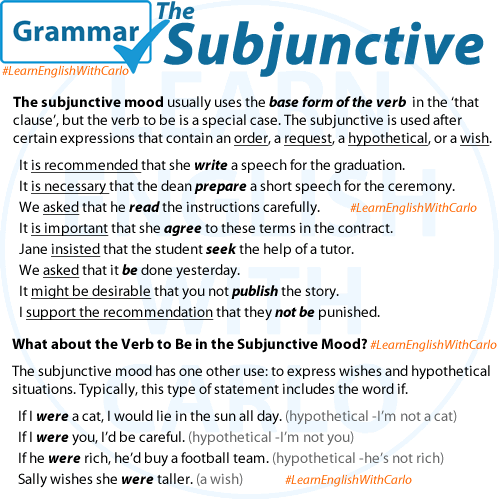The subjunctive mood in English is used to express wishes, suggestions, demands, or hypothetical situations. It often appears after certain verbs (like “suggest” or “recommend”) and is characterized by using the base form of the verb, even with singular subjects (e.g., “I suggest that he go“). It can also express unreal or hypothetical situations, particularly with “were” (e.g., “If I were you…”).
The subjunctive mood usually uses the base form of the verb in the ‘that clause’, but the verb to be is a special case. The subjunctive is used after certain expressions that contain an order, a request, a hypothetical, or a wish.
- It is recommended that she write a speech for the graduation.
- It is necessary that the dean prepare a short speech for the ceremony.
- We asked that he read the instructions carefully.
- It is important that she agree to these terms in the contract.
- Jane insisted that the student seek the help of a tutor.
- We asked that it be done yesterday.
- It might be desirable that you not publish the story.
- I support the recommendation that they not be punished.
What about the Verb to Be in the Subjunctive Mood?
The subjunctive mood has one other use: to express wishes and hypothetical situations. Typically, this type of statement includes the word if.
- If I were a cat, I would lie in the sun all day. (hypothetical because I’m not a cat)
- If I were you, I’d be careful. (hypothetical because I’m not you)
- If he were rich, he’d buy a football team. (hypothetical because he’s not rich)
- Sally wishes she were taller. (a wish)

SEE ALSO: ‘If I was’ vs ‘If I were’
